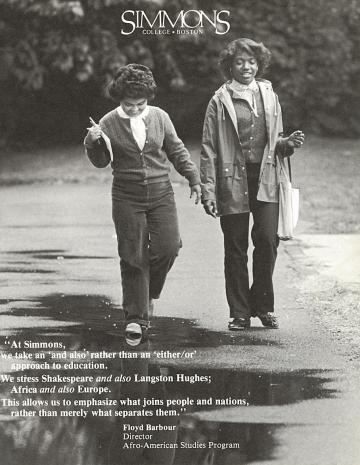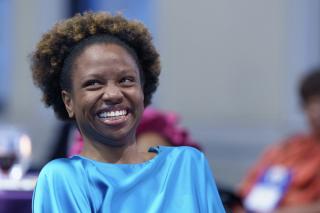Public Health major and Chemistry minor Sunei Clarke ’24 participated in the Simmons Black Oral History Project. Under the direction of Assistant Professor of Africana Studies Tatiana M.F. Cruz, Clarke conducted interviews with alumnae/i to document and memorialize the experiences of Black students at Simmons through the generations. Clarke, who also serves as the Soul Vice President of the Black Student Organization (BSO), spoke with us about the process of creating oral histories and the value of Africana Studies for all majors.
“History is powerful. Our [African and African diasporic] history is so rich in knowledge and understanding,” says Sunei Clarke ’24, a Public Health major, Chemistry minor, and Soul Vice President of Black Student Organization (BSO). “The question I often ask myself is: ‘If you don’t know your history or your past, then do you really know who you are?’ It’s been especially important for me to learn about Black history while I’m at Simmons, as I realize that after I leave here I may never have this kind of opportunity again.”
Since she came to Simmons in 2020, Clarke has taken two courses with Tatiana M.F. Cruz, Assistant Professor and Interdisciplinary Program Director of Africana Studies and Women’s and Gender Studies. For Cruz’s spring 2022 course, “Behind the Veil: Simmons Black Oral History Project” (AST 375), Clarke and fellow students interviewed several Black alumnae/i between the Classes of 1966 and 1981. Cruz’s students also had the opportunity to interview one another.

By creating this unique course, Cruz taught students how to compile oral histories and helped them archive Black students’ experiences through the generations. The course also commemorates the 50th anniversary of Africana Studies at Simmons, which was originally called the Black Studies Program upon its founding in 1972. As Cruz conveyed to The Simmons Voice in 2022, “I hope this is the beginning of a long relationship between [current Simmons students and] Black alumnae/i who reinvigorate Africana Studies here at Simmons.”
For Clarke, the Simmons Black Oral History Project helped her discover and appreciate the lives and accomplishments of the University’s Black alumnae/i. “This project is about the special people and things that we have all found at Simmons. It is about the documentation of the stories and experiences of the everyday individuals who have come through these doors. Not everyone who graduates from Simmons becomes a major news anchor with a big platform, but there are so many amazing people with extraordinary stories to tell.”
During the course, students interviewed alumnae/i who agreed to participate via Zoom. Cruz paired Clarke with Beverly Byron ’75, who double majored in Nursing and Sociology. “Ms. Byron was a wonderful person to interview,” recalls Clarke. “Even though we are nearly half a century apart, we have so many points of connection. We talked a lot about where she socialized in Boston and how she got initiated into the city’s Black culture. For example, she mingled at Chocolate City (CC), an all-Black living community at MIT that throws great parties. Interestingly, I have been to CC and several other venues that Ms. Byron mentioned, and I recommend them to others.”
Byron came to Simmons in the immediate aftermath of the “Ten Demands” of 1969, when BSO members implored the University to advance racial equity on campus. “Something that Ms. Byron told me is that you have to advocate for yourself. Whether it’s during your time at Simmons or the years following Simmons, you have to do what is necessary to elevate yourself and others,” says Clarke.
In their interview, Byron also reminisced about Simmons’ Black sisterhood. “Ms. Byron spoke of the lifelong friendships that she forged at Simmons and maintained through the African American Alumnae/i Association (AAAA),” says Clarke. “After attending my first Black Alumnae/i Symposium hosted by the AAAA last year [in 2023], I began to understand why this event is like a family reunion. I witnessed a sisterhood that is so palpable; this is a true homecoming for the Simmons sisters.”
The experience of meeting Byron and creating an oral history archive was incredibly rewarding for Clarke. “It helped me understand what Simmons has been for other people and what it can be for my generation. And now I am motivated to gather stories from my grandmothers. They have so much to tell, and all it takes is just asking questions.”
Inspired by her interview with Byron, Clarke created a video, “What Does Simmons Mean to Us?” Dedicated to incoming Black students, Clarke’s commentary reveals how history should involve a presentation of both the good and the bad. “In the case of Simmons’ history, there has been racial exclusion. But we also see what the University has become, largely due to the indomitable agency of Black women,” she reflects.
On a personal level, participating in the Black Oral History Project helped Clarke understand her own relationship with Simmons. After attending a racially diverse high school in Brooklyn that, as Clarke puts it, “resembled a mini HBCU,” Simmons presented her with a culture shock. However, as she knows now, finding community is a quintessential part of the college experience.
“Life is a shared experience, and most of our fondest memories involve other people,” says Clarke. “College is the same thing, especially at a small school like Simmons. . . Spread your wings; Boston is a big city, and not everyone you meet will be Black. It’s important to find a connection to people like you as well as others from different cultures and places.”
With BSO’s Black History Month 2024 programming in full force, Clark finds herself meditating upon the richness of Black identity. “To be Black and to be on the internet during Black History Month is so exciting. Every February, I learn a new fact or watch a fascinating documentary. There’s just something in the air at this time of year, and it is exceptionally special.”

